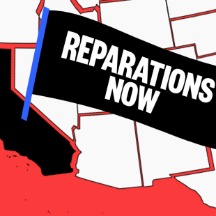The California Task Force to Study and Develop Reparation Proposals for African Americans released its Interim Report with a “graphic content warning” statement. The 492-page report includes a 15-page Executive Summary and 12 chapters ranging from “Control Over Creative Cultural and Intellectual Life” to “The Wealth Gap.” The chapters cover specific areas of discrimination, but acknowledges that “the effects of slavery infected every aspect of American society over the last 400 years, that it is nearly impossible to identify every “badge and incident of slavery.””
The report cited many forms of antagonism that many have come to accept as normal or expected including stating that local governments in California having discriminated “against, punished, and penalized Black students for their fashion, hairstyle, and appearance” and state-funded California museums having “excluded Black art from their institutions.”
The Task Force concludes, “Violence against Black trans people are underreported, unresolved and under-investigated.”
It also cited the government sanctioned Fair Labor Standards Act of 1938. “The Act essentially outlawed child labor in industrial settings—where most white children worked— and allowed child labor in agricultural and domestic work—where most Black children worked.” When it comes to “An Unjust Legal System,” the Task Force concludes, “Violence against Black trans people are underreported, unresolved and under-investigated.”
The Task Force had already created a fissure in March when it voted to limit state compensation to “an individual being an African American descendant of a chattel enslaved person or the descendant of a free Black person living in the US prior to the end of the 19th century (Dec 31, 1900).”
The Task Force’s proposed system would, for instance, include the descendants of Mary Elizabeth Lange (circa 1784-1882), who was born in Hispaniola, fled to Cuba after the Haitian Revolution, and eventually settled in Baltimore, as a free woman, by 1813. Mother Lange, as she is often called, cofounded the historic Oblate Sisters of Providence in Baltimore.
Reparations Interim Report Released

The debate over lineage-based reparations versus harms-based reparations may become the new on-stage slap heard around the neighborhood. Opponents of lineage-based system such as the The National Black Cultural Information Trust say extensive ancestry tracing measures can be time-consuming, expensive, traumatic, and create additional barriers to access. Proponents of harms-based reparations says its system rejects false and invasive purity standards and redirect focus on documented harms done to our communities.
The proposed remedies range from the specific to the vague.
The proposed remedies range from the specific to the vague. One specific remedy would “prohibit for-profit prison companies from operating within the system (i.e. companies that control phone calls, emails, and other communications)” and another to “provide funding for free tuition to California colleges and universities.”
Vague remedies would “require that curriculum at all levels and in all subjects be inclusive, free of bias, and honor the contributions and experiences of all peoples regardless of ethnicity, race, gender, or sexual orientation” and another would “reduce the density of food swamps (i.e., high densities of fast-food restaurants) in Black neighborhoods.”
California established the Task Force in 2020, setting the path for California to be the state that leads the country on a discussion for reparations for African Americans. Evanston, Illinois, became the first city to make reparations available to Black residents in 2021. California will issue its final report before July 1, 2023.
Also read in this issue: Yesteryear’s Redlining Means Environmental Racism Today
The proposed remedies range from the specific to the vague.
The proposed remedies range from the specific to the vague. One specific remedy would “prohibit for-profit prison companies from operating within the system (i.e. companies that control phone calls, emails, and other communications)” and another to “provide funding for free tuition to California colleges and universities.”
Vague remedies would “require that curriculum at all levels and in all subjects be inclusive, free of bias, and honor the contributions and experiences of all peoples regardless of ethnicity, race, gender, or sexual orientation” and another would “reduce the density of food swamps (i.e., high densities of fast-food restaurants) in Black neighborhoods.”
California established the Task Force in 2020, setting the path for California to be the state that leads the country on a discussion for reparations for African Americans. Evanston, Illinois, became the first city to make reparations available to Black residents in 2021. California will issue its final report before July 1, 2023.
Also read in this issue: Yesteryear’s Redlining Means Environmental Racism Today
Advertisers | Contact Us | Events | Links | Media Kit | Our Company | Payments Pier
Press Room | Print Cover Stories Archives | Electronic Issues and Talk Radio Archives | Writer's Guidelines






